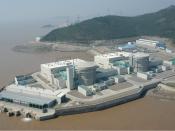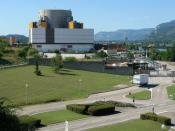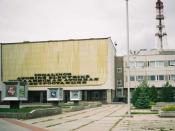Iodide pills, utilized to strengthen the body's immunity to radioactivity, may become a common item on one's shopping list if the nuclear power market continues to expand. The number of nuclear reactors being established is slowly rising. As this number rises, so too does the chance of a nuclear meltdown. Discontinued construction of additional reactors will keep risks minimal. Nuclear power should not serve as the nation's prime source of energy. The results of an accidental meltdown are irreversible and catastrophic.
Achieving nuclear power requires the splitting of uranium atoms. The actual division of the atom produces tremendous amounts of heat. This heat is used to boil water creating steam. The steam powers turbine-generators which produce more than enough electricity to circulate throughout any given region. This holds true until the resource is depleted. Uranium is not renewable, meaning once it's gone, it's gone. The waste uranium leaves behind is extremely harmful and must be buried for years; yet even then it still posses a threat.
A century or more must pass before all radioactivity has dissipated. A proper way to safely store nuclear waste has yet to be developed.
Many supporters claim nuclear power is very cost effective as compared to fossil fuels. Because of the radioactive hazards, a lot of money is invested to insure safety. This extra money needed for safety leads to shrinkage of differential cost when nuclear and fossil-fuels are
Hall 2
compared. Construction costs for a nuclear plant rise high over those of fossil-fuel plants. In the long run, not much money is saved.
There is no room for accidents at a nuclear power plant. A nuclear explosion would be devastating. Radioactive dust would spread for hundreds of miles, altering atoms within people, plants, animals, and even the soil. The alteration of...


